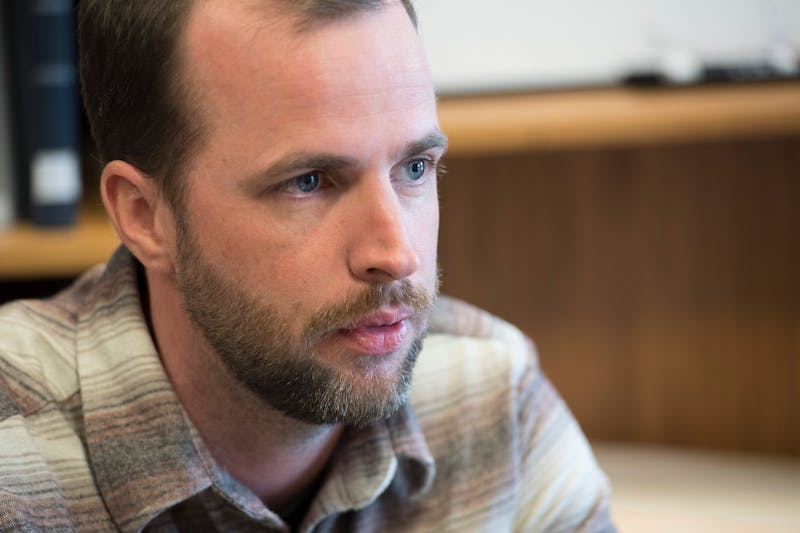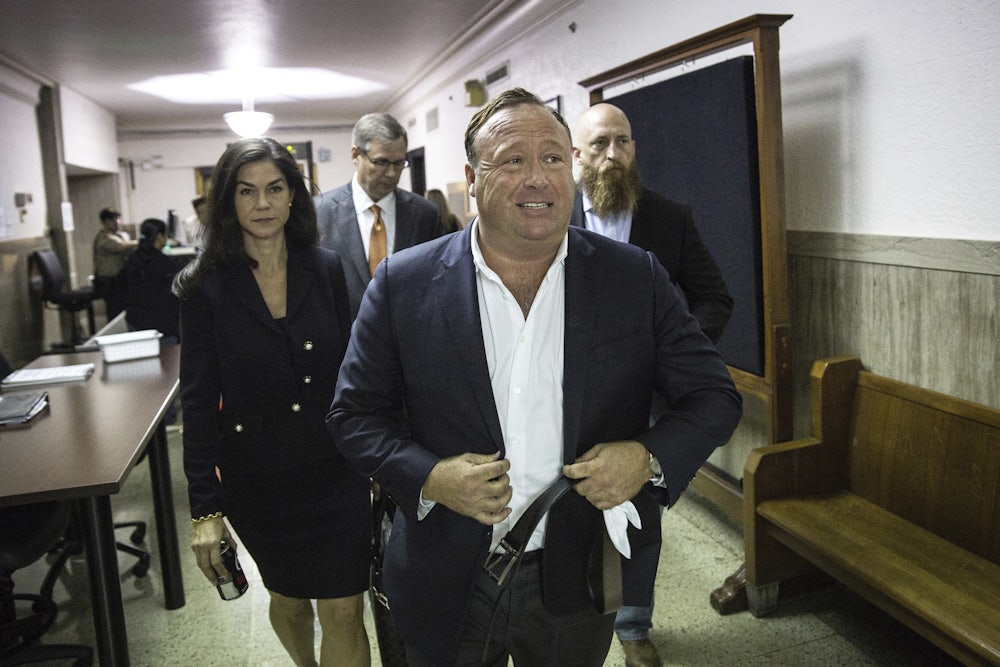Brennan Gilmore didn’t want to post the video online at first. The 39-year-old State Department employee was taking part in an anti-racism demonstration in Charlottesville, Virginia, last summer when a car plowed into the crowd, killing 32-year-old Heather Heyer and injuring 19 others. The driver, a white nationalist, was arrested and charged with first-degree murder.
Video of car hitting anti-racist protestors. Let there be no confusion: this was deliberate terrorism. My prayers with victims. Stay home. pic.twitter.com/MUOZs71Pf4
— Brennan Gilmore (@brennanmgilmore) August 12, 2017
Gilmore initially feared the footage would be used for alt-right propaganda, he told me. But he decided to post it on the internet after learning that some commentators were speculating that the attack was an accident. Media outlets around the world quickly shared what he’d filmed and interviewed him about his experience. The next day, his sister called and asked if he’d spoken to his parents.
“My heart kind of sank and I asked what’s going on,” he told me, “and she said, ‘Well, I found this alt-right website that said you were behind the attack, and they had put Mom and Dad’s address online.’ I looked at the link she sent me and they had all my family members’ names and my folks’ address.”
The doxxing of Gilmore was the first shot in what became a constant barrage of harassment and death threats from alt-right groups, conspiracy theorists, and other online commenters for his incidental role in documenting the attack. Conservative websites like InfoWars and The Gateway Pundit published articles that insinuated or outright accused Gilmore of staging the attack.
“The random Charlottesville observer who was interviewed by MSNBC and liberal outlets turns out to be a deep state shill with links to George Soros,” Gateway Pundit founder Jim Hoft wrote, referring to the billionaire liberal donor, who is a frequent subject of right-wing—and often anti-Semitic—conspiracy theories. “It looks like the State Department was involved in Charlottesville rioting and is trying to cover it up.” InfoWars founder Alex Jones published a video in which he accused Gilmore of being a CIA operative and claims he is paid $320,000 a year by Soros.
These allegations rapidly spread online, taking a toll on Gilmore’s reputation and livelihood. “In almost every way—personal, professional—it upended my entire life,” he told me. “I had people I grew up with start reading Alex Jones’s videos and stories about me, and then spreading them about me online.”
There’s a tendency to dismiss conspiracy theorists as crazy or insignificant in mainstream politics, but Gilmore’s case underscores the profound impact they can have on a person’s life, and on American political discourse. In March, he turned to the legal system and sued Jones, Hoft, and several others for allegedly defaming him. It’s one of multiple lawsuits filed recently by people who say they’ve been harmed by conspiracy theories from right-wing outlets, but they face a high legal standard that protects journalism’s saints and sinners alike.
Gilmore’s lawsuit comes as these outlets are receiving more mainstream recognition and high-profile supporters than ever. As a presidential candidate in the summer of 2015, Donald Trump appeared on Jones’s eponymous radio show and thanked him for his support. “Your reputation is amazing,” Trump told Jones. “I will not let you down.” The White House has also granted credentials to a reporter for The Gateway Pundit. Stories from InfoWars and Breitbart News regularly reached Trump’s Oval Office desk until White House Chief of Staff John Kelly cracked down on the president’s information streams last year. (Kelly reads Breitbart himself, though.)
Conspiratorial thinking isn’t relegated to the fringes anymore, either. A few days after the Charlottesville attack, Fox News host Sean Hannity cited dubious internet articles in questioning “whether or not antifa agitators that showed up in Charlottesville on Saturday were bought and paid for” by a Los Angeles–based PR firm. Texas Representative Louie Gohmert called for the Justice Department to investigate both the white-nationalist protesters at Charlottesville and Virginia Democratic officials whom he said “herded these groups to create violence so they could brag.”
Jones is also currently facing lawsuits from family members who lost loved ones in the Sandy Hook school shooting at Newtown, Connecticut, in 2012. Jones has frequently claimed that the shooting was a false-flag attack and that the grieving families of the 28 victims—including 20 young children—are “crisis actors” hired by malign forces to pretend to grieve. In the most recent lawsuit, filed last week, some of the families describe Jones as “the chief amplifier for a group that has worked in concert to create and propagate loathsome, false narratives about the Sandy Hook shooting and its victims, and promote their harassment and abuse.”
Jones’s lawyers were unavailable for comment, but in a brief filed last week calling for Gilmore’s lawsuit to be dismissed, they told the court that his claims “are premised on wild-eyed extrapolations from fairly typical news and political commentary.” They also explained that Jones’s observations were based on Gilmore’s media appearances after the attack. “That aroused [Jones’s] suspicion, which he expressed off-the-cuff in the passionate, hyperbolic, over-the-top style that is characteristic of his radio show and videos,” the brief said. “Any viewer would recognize that as his opinion, because that is what they know to expect from Alex Jones: providing a different take on the news of the day by connecting reported facts in unexpected and illuminating ways.”

Gilmore told me he hopes his case will set a precedent for challenging these conspiracy-minded outlets and reckoning with the societal damage they’ve done. Having taken leave from the State Department in 2016 to work on Democrat Tom Perriello’s Virginia gubernatorial campaign, he’s now worried that when he returns to the Foreign Service, foreign officials with whom he meets will look into his background and see the conspiracy theories about him. “I remember Google searching myself a week after [the attack] to see what all these articles were and the only thing I could find was that I had been in Africa orchestrating genocide, and then took those skills and applied them to Charlottesville,” he told me.
Alex Jones and his cohort have a formidable legal threshold on his side, one that protects journalism’s sinners and saints alike: the “actual malice” standard. The Supreme Court established it as the benchmark test in the 1964 case New York Times Co. v. Sullivan, in which the Times fended off a lawsuit brought by a city commissioner in Montgomery, Alabama. At issue was an ad placed in the newspaper by a group of black clergy condemning violence against black civil-rights protestors by “Southern violators,” including the Montgomery police. Because Sullivan oversaw the police, he believed the ad defamed him.
The court rejected the claim and set a high hurdle for future lawsuits to clear under the First Amendment. To prevail, a wronged party must prove that a publisher distributed negative material with “actual malice—that the statement was made with knowledge of its falsity or with reckless disregard of whether it was true or false.” Harsh criticism and mere errors would not warrant damages. Justice William Brennan, the opinion’s author, wrote that “uninhibited, robust, and wide-open” social and political debates in America “may well include vehement, caustic, and sometimes unpleasantly sharp attacks on government and public officials.”
“Vehement” and “caustic” can easily describe Jones’s style, but his contributions to American public discourse are more dubious. The Supreme Court’s defamation precedents are meant to shield newspapers that scrutinize power and magazines that satirize prominent figures. How far should those protections go for media outlets that use conspiracy theories to spread damaging insinuations and falsehoods about their political opponents?
Even now, defamation law hasn’t shielded Jones from all consequences. In April of last year, Jones claimed that the yogurt company Chobani bore responsibility for a tuberculosis outbreak and sexual assaults near an Idaho factory where it employs refugees. Chobani sued Jones for defamation, then dropped the lawsuit after he publicly backtracked. “On behalf of InfoWars, I regret that we mischaracterized Chobani, its employees, and the people of Twin Falls, Idaho, the way we did,” he told his listeners.
A month earlier, Jones had also recanted his belief in the Pizzagate conspiracy theory, which took an even darker turn after the InfoWars founder helped spread it. The theory revolved around Hillary Clinton’s campaign chairman John Podesta and his personal emails, which were stolen by Kremlin-backed cyberthieves and later published by WikiLeaks in the 2016 election’s final weeks. The emails included substantive political discussions but also exchanges between Podesta, his friends, and his family about mundane personal matters like dinner plans.
Conspiracy theorists acting out of pure malice soon theorized that Podesta’s humdrum emails about pizza toppings were actually coded discussions about child sexual abuse. InfoWars and other conspiracy-minded outlets helped spread the claims, which centered around Comet Ping Pong, a local pizzeria in Washington that quickly came under a deluge of digital harassment for its alleged role as a vast child-trafficking hub for the nation’s elites.
The obviously false allegations still persuaded at least one person: Edgar Welch, a 28-year-old man who decided to take action. Welch drove to D.C. from North Carolina in December 2016 and opened fire at least once inside the pizzeria with an AR-15 rifle, demanding that patrons and employees free the child-abuse victims he believed were being kept there. None were found; Welch was arrested and received a four-year prison sentence. He told the Times after his arrest that he had listened to Jones’s radio show, though he said he found Jones to be “a bit eccentric.”
Comet Ping Pong’s experience, in particular, haunts Gilmore, who told me he has to be “constantly looking over my shoulder” after the threats he’s received. “For weeks I would wake up every morning and have people emailing me and Facebook me, ‘You’re going to be a dead man. Your family better watch out. Your dog better watch out,’” Gilmore said. “That stuff has continued up into this year. I had someone post my Facebook wall not that long ago, ‘Your body’s going to be found on the bottom of the Rivanna River,’ which is the river that’s like a half-mile from my house.”
As with the attacks on Gilmore, there’s a deeply political motive to Pizzagate-related smears of a top Democratic official and accusations that Chobani’s refugee employees are spreading disease and rape. Such far-right conspiracy theories can serve multiple purposes: to attack the reputation and integrity of perceived opponents, to animate and inflame an ideologically driven base, and to obfuscate events that harm the conservative cause. Because democracy depends on honest and genuine discussions between opposing sides to resolve differences, these bad-faith smears can be corrosive.
“It’s really concerning as someone who witnessed the horror in Charlottesville that people were doing this in a very cynical and calculated way because they didn’t like what my video showed,” Gilmore told me. “This is the tried-and-true tactic of these types of people to undermine the credibility of a witness when what that witness is testifying to goes against your political objective. We saw the natural conclusion of white supremacy in the streets of Charlottesville and they didn’t like that. They wanted to just wipe the story away.”
